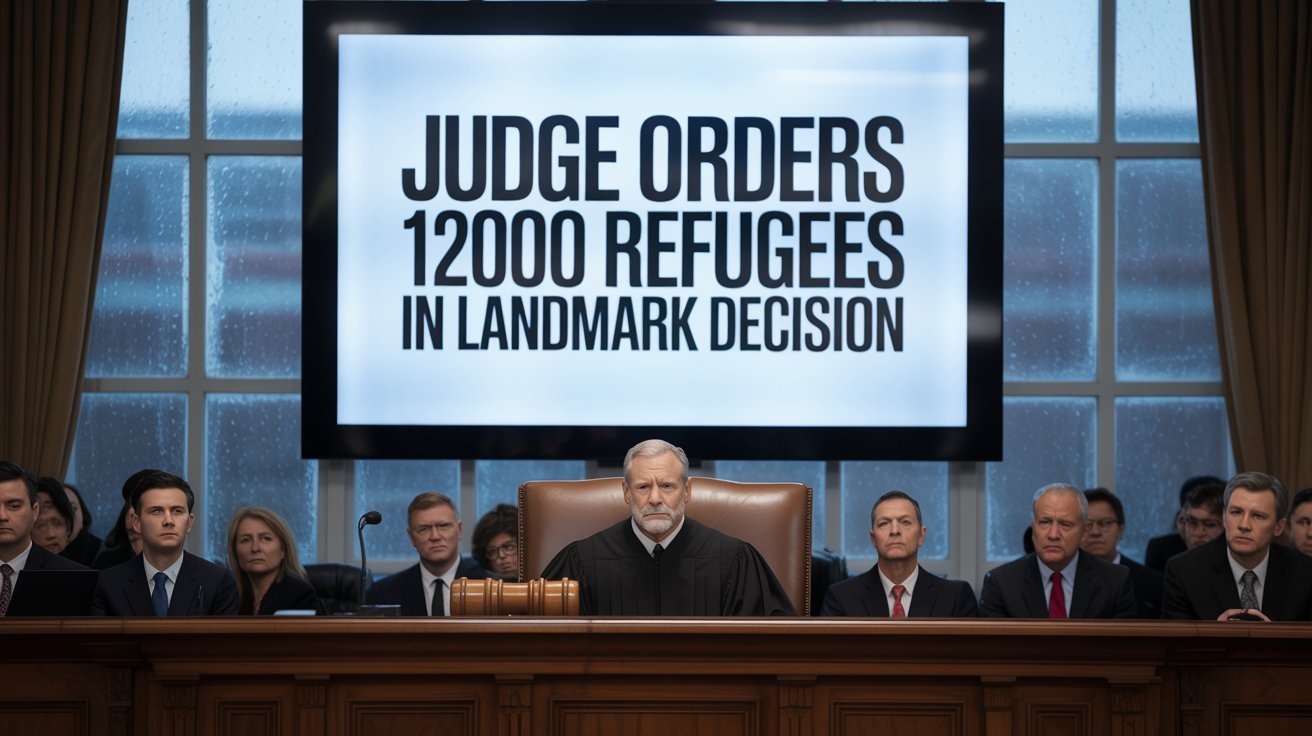Law
Judge Orders 12000 Refugees in Landmark Decision

In a decision that has sent ripples through the legal and political communities, a federal judge orders 12000 refugees to be granted entry into the country under immediate humanitarian grounds. This decision marks a turning point in refugee policy and highlights the evolving legal interpretations around asylum rights. The court’s verdict is grounded in both domestic constitutional provisions and international human rights commitments, underscoring the nation’s obligations in times of global crisis. As the judge orders 12000 refugees into the system, various political and civil entities are scrambling to adapt.
Context Behind the Legal Order
The ruling did not occur in a vacuum. Over the past year, a surge in global conflict, especially in regions of the Middle East and parts of Sub-Saharan Africa, has displaced millions. With mounting international pressure and a backlog in asylum applications, human rights lawyers filed a case demanding that authorities accelerate and expand the intake process. In response, the court reviewed a multitude of humanitarian arguments and binding international agreements. As a result, the judge orders 12000 refugees to be processed and admitted without delay. This move, according to legal scholars, sets a precedent that could affect future immigration-related rulings.
You Might Also Like: How to Use Simpcitt Effectively in Your Blogging Strategy
Reactions from Government and Opposition
Reactions to the ruling have been deeply divided. While some branches of government praised the humanitarian emphasis of the decision, others criticized the judiciary for overstepping its bounds. The administration has signaled compliance but with caveats about logistical and resource-based limitations. Meanwhile, opposition leaders have voiced strong opinions on both sides, with some arguing that the judge orders 12000 refugees without proper vetting measures in place, and others hailing it as a necessary moral stance in turbulent times.
Humanitarian Groups Applaud the Decision
Among those most vocal in their support are humanitarian organizations and refugee advocacy groups. They view the ruling as a victory for compassion and justice. Many have pointed out that the judge orders 12000 refugees at a time when global solidarity is most needed. These organizations are now coordinating with local authorities to ensure housing, medical care, and integration services are adequately prepared. Their focus is to ensure that this sudden influx does not lead to gaps in essential services or increase the burden on existing systems.
Local Communities Prepare for Integration Efforts
In cities and municipalities expected to receive a large share of the incoming population, preparations are already underway. Community leaders, non-profit organizations, and local volunteers are mobilizing to provide basic needs and cultural orientation programs. As the judge orders 12000 refugees, local governments are being urged to allocate budgetary resources for social services, language classes, and workforce integration initiatives. While some community members express concerns about job competition and housing shortages, others have welcomed the opportunity to offer a new start to displaced individuals.
International Implications of the Judicial Order
On the global stage, the court’s decision has been met with a mixture of praise and scrutiny. Several international bodies, including the United Nations High Commissioner for Refugees, have lauded the order as a model of responsible leadership. Other countries facing similar refugee crises may look to this case as a benchmark for formulating their own policies. When a judge orders 12000 refugees into a nation, it sends a powerful message about the country’s willingness to uphold human rights and international agreements.
Security and Vetting Concerns Addressed
Critics of the order have raised security concerns, questioning the robustness of the vetting procedures. In response, immigration authorities have assured the public that all 12000 individuals will undergo rigorous background checks in compliance with national security protocols. Officials clarified that although the judge orders 12000 refugees to be accepted. This does not mean the elimination of standard security measures. Every case will be subject to the usual layers of scrutiny before final settlement.
Legal Foundations of the Decision
The ruling rests heavily on constitutional protections and existing asylum laws. The judge cited sections of both national law and international conventions such as the 1951 Refugee Convention, which obligates signatory states to protect individuals fleeing persecution. By referencing these legal instruments, the judge orders 12000 refugees to be treated with urgency and fairness. This legal interpretation, if upheld by higher courts, could redefine future applications of asylum law and influence ongoing legislative debates.
Economic Impact and Workforce Participation
Economists and labor market analysts are closely watching the development. There is considerable debate about how the sudden arrival of 12000 refugees might impact local job markets. Some argue it could stress low-income sectors, while others believe the infusion of new labor could fill existing workforce gaps. The fact that a judge orders 12000 refugees into the system has prompted discussions about vocational training, language education, and credential recognition programs to fast-track integration into the economy.
Media Coverage and Public Perception
Media outlets across the spectrum have extensively covered the decision. Progressive publications have framed the ruling as a humanitarian win, while more conservative commentators have raised questions about its long-term effects. Online forums and social media platforms are abuzz with opinions, ranging from support and empathy to apprehension and fear. The phrase “judge orders 12000 refugees” has become a trending topic, serving as both a rallying cry for advocates and a point of contention for critics.
Legal Challenges and Appeals
Although the order has been issued, legal experts predict that it may face appeals. Some government officials and state-level administrators have hinted at challenging the ruling on grounds of federal overreach. If the appeals process moves forward, the case could reach the Supreme Court, where broader constitutional questions will be examined. However, until a higher court intervenes, the original directive stands. The judge orders 12000 refugees to be admitted within the stipulated timeframe.
Personal Stories from Affected Refugees
Humanizing the headlines are the voices of refugees who stand to benefit. Many have been living in camps for years, caught in bureaucratic limbo and separated from families. For them, the news that a judge orders 12000 refugees to be admitted is more than a legal ruling—it is a lifeline. Personal testimonies from refugee families reveal stories of survival, resilience, and hope for a better future. These narratives are now becoming a focal point for campaigns aiming to generate public empathy and support.
Religious and Faith-Based Reactions
Faith communities have also weighed in on the decision. Many religious leaders see the mandate as a moral imperative, citing sacred texts that advocate for the protection of strangers and the oppressed. Church groups, mosques, and temples are organizing donation drives and volunteer efforts in anticipation of the new arrivals. They echo the sentiment that when a judge orders 12000 refugees to enter, society has a moral obligation to welcome and assist them.
Educational and Healthcare System Readiness
Education and health sectors are preparing to accommodate the influx. School districts are evaluating classroom capacities and hiring bilingual educators, while hospitals are coordinating with NGOs to provide initial health screenings. The ruling that a judge orders 12000 refugees requires these sectors to respond swiftly. Government grants and community-based programs are expected to play a pivotal role in facilitating a smooth transition.
Legislative Momentum and Political Ripple Effects
The decision has re-energized legislative debates on immigration reform. Lawmakers are proposing bills aimed at either supporting or curtailing similar judicial interventions. The reality that a judge orders 12000 refugees into the country is now being used as a case study in legislative hearings. It highlights the judiciary’s role in shaping policy and reignites discussions about the balance of power between branches of government.
Long-Term Integration and Success Metrics
Beyond the immediate logistics, experts stress the importance of long-term integration. Metrics for success will include employment rates, educational attainment, and civic participation among the refugee population. Integration programs will require sustained investment and public support to ensure that the decision. Where a judge orders 12000 refugees—is not only legally implemented but socially successful.
Conclusion: A Turning Point in Asylum Policy
The unprecedented ruling that a judge orders 12000 refugees to be granted entry is likely to be remembered as a landmark moment in the nation’s immigration history. It underscores the judiciary’s potential to act decisively in humanitarian crises and reflects the ongoing evolution of asylum policy. As the country navigates this complex and emotional issue. The hope is that compassion, law, and pragmatism can coexist to forge a brighter future for all. The coming months will reveal how this bold legal move will be operationalized and whether it will become a catalyst for broader change.

 Music7 months ago
Music7 months ago[Album] 安室奈美恵 – Finally (2017.11.08/MP3+Flac/RAR)

 Music7 months ago
Music7 months ago[Album] 小田和正 – 自己ベスト-2 (2007.11.28/MP3/RAR)
- Music7 months ago
[Single] tuki. – 晩餐歌 (2023.09.29/Flac/RAR)
- Music7 months ago
[Album] back number – ユーモア (2023.01.17/MP3/RAR)

 Music7 months ago
Music7 months ago[Album] 米津玄師 – Lost Corner (2024.08.21/MP3 + Flac/RAR)
- Music7 months ago
[Single] ヨルシカ – 晴る (2024.01.05/MP3 + Hi-Res FLAC/RAR)

 Music7 months ago
Music7 months ago[Album] ぼっち・ざ・ろっく!: 結束バンド – 結束バンド (2022.12.25/MP3/RAR)

 Music7 months ago
Music7 months ago[Album] Taylor Swift – The Best (MP3 + FLAC/RAR)












